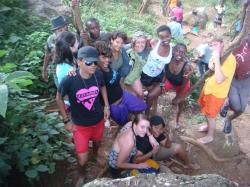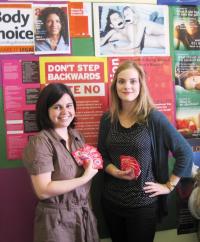Secondary menu
IHRP Interns Work to Protect Women's Rights
This year, the International Human Rights Program at the Faculty of Law sent nearly 20 students around the world to work with partner organizations focused on the protection and promotion of international human rights. Three interns, Lauren Rock, Heather Burnett, and Amanda Montague, worked with organizations in Kenya, Ireland, and Canada, respectively, to advance the human rights of women. Read their letters from the field here...
Lauren Rock: Aids-Free World (Nairobi, Kenya)

I applied to the IHRP grant program to intern with Aids-Free World after working with their legal director throughout myrecent year of law school through the IHRP working group I co-directed. Aids-Free World placed me in Kenya to conduct research on the status of the domestic justice response to violations that occurred during the violence following the December 2007 National Election. It is well known sexual violence was politically motivated and condoned during that period of chaos in Kenya, from at least late December 2007 to late February of 2008. My background knowledge of justice institutions in the region from the IHRP working group prepared me well to investigate the potential for recourse in the aftermath of such crimes in Kenya.
My supervisor, the Legal Director of Aids-Free World, has focused my research specifically on witness protection for survivors of sexual violence international crimes. Rape was rampant during the two months of chaos that followed the contested election, and evidence suggests the societal incidence of rape has increased since as a result. Witness protection is an interesting angle to have spent time researching, causing me to have to understand the social context of rape here, if only to the limited extent possible for a relative newcomer.
Almost immediately upon arriving at my desk on May 12, I found convincing evidence that the Witness Protection Agency of the Department of Public Prosecutions is inoperative- on a 4 year stint as such- pending signature by Kibaki, the President, of the Amended Act (it was signed May 14th). Noting this, Aids-Free World asked me to paint them a picture of the general multi-sector response to SGBV, with a mind to understanding Witness Protection from the ground up.
Therefore, I spent over 4 weeks interviewing service providers. The over 40 interviews I conducted took place predominantly in Nairobi, but also on a 5 day road trip to Kisumu, in the far West; Eldoret, in Rift Valley; and Nakuru, in Rift Valley. At the end of each week I submit a report of my progress. This included a synopsis of the weeks activities, findings, and analysis- also any questions needing clarity. The Legal Director and I would then have a skype call 2 days after they received my report to give me feedback and guidance. This was extremely beneficial for focusing my research on the important aspects of Kenya’s system to reflect the intentions of trained advocates. Also, they have helped me to recognize my own role as a white “muzungu” temporary researcher. Understanding the context is important to interpret what my interviewees say and ask the correct questions.
The first definite outcome of my internship will be to write a report on ‘Sexual Violence Crime- Witness Protection: Importance, Challenges and Prospects in Post Conflict Kenya’ for publication in a series comparing the topic across jurisdictions. The project has been a thrill, a success and a thorough window into international and comparative women’s human rights law applied to life in Kenya.
Heather Burnett: Irish Family Planning Association (Dublin, Ireland) As of writing this letter, I have been working with the Irish Family Planning Association (IFPA) for just over seven weeks. The IFPA advocates for sexual and reproductive health rights in Ireland.
As of writing this letter, I have been working with the Irish Family Planning Association (IFPA) for just over seven weeks. The IFPA advocates for sexual and reproductive health rights in Ireland.
A lot of non-Irish people I meet are surprised when I tell them that abortion is essentially illegal in Ireland. The failure of the Irish Government to bring its laws into step with human rights norms in this area constitutes a breach of a number of international treaties to which Ireland is a signatory. The IFPA’s advocacy department is striving to correct this problem.
Having only just completed my first year of legal training, I am admittedly still a bit mystified by the myriad complexities of international law. But I am receiving a lot of support from my supervisor, and successfully learning as I go. During my first five weeks at the office, I wrote a shadow report for the UN Committee on Economic, Social and Cultural Rights regarding Ireland’s lack of progress on reproductive health rights under the respective covenant. I am currently working on a similar report for the UN’s Universal Periodic Review. This report will have a broader focus, and will survey the large variety of international agreements to which Ireland’s criminalization of abortion is contrary.
In between writing reports, I have also taken on a number of tasks to improve the day-to-day functioning of the IFPA. I have helped create a mass contact database of NGOs, government officials, experts, and media outlets. I have also sifted through news articles and websites to compile a comprehensive list of anti-choice arguments, to which I am now formulating pro-choice responses.
I have been able to do some work outside of the office as well. The IFPA runs the Irish version of an international AIDS awareness campaign called dance4life, and I have accompanied the trainers and volunteers community centres to help them administer the program. My responsibilities at these events have ranged from photographing the training sessions to giving demonstrations on the correct use of contraception.
The experience I am gaining in human rights law here at the IFPA is certainly invaluable. However, the most constructive aspect of this internship so far is the preview it has given me into NGO life. The causes the IFPA fights for are both socially important and intellectually exciting, but the daily battles are much the same as you would find in any place of employment. Working for an NGO is not all protests and inflammatory remarks; it’s real work. But it’s work that I am very grateful to have been given the opportunity to do. And overall, given the subject matter that we deal with, it is rarely a dull day at the IFPA.
Amanda Montague: Centre for Equality Rights in Accommodation (Toronto, Canada)
I am currently about halfway through my time working with the Centre for Equality Rights in Accommodation (CERA), and it has been a thoroughly enjoyable and challenging experience so far. CERA is a unique organization in Canada, in that it incorporates international human rights in all areas of its work. So, already, I have gained incredible experience engaging in human rights work at the international, national and local levels.
Because part of CERA’s mandate is to advocate for compliance with Canada’s international human rights obligations, particularly in the areas of economic and social rights, much of my work thus far has involved international human rights research. I have prepared memos, for example, on the recent jurisprudence under the Optional Protocol to CEDAW, with an emphasis on complaints related to economic and social rights; and on major current issues and initiatives in the area of women’s economic and social rights, both within and outside the United Nations. Likely the most exciting work I have had the opportunity to do in the international area was to research and draft a submission to the Rapporteurship on the Rights of Women at the Inter-American Commission on Human Rights. The submission offered an account of the current state of women’s economic and social rights in Canada, with a focus on access to housing and social assistance.
Another part of CERA’s work is to advocate for the recognition and implementation of economic and social rights on the national level. This work includes campaigns for law reform, and participation in key litigation. As part of this work, CERA’s partner organization, the Charter Committee on Poverty Issues, is currently intervening in a case that seeks to have the social condition of poverty and receipt of social assistance recognized as analogous grounds of discrimination under s. 15 of theCharter. In preparation for the hearing at the Federal Court of Appeal, I have assisted in research for this intervention, as well as drafting of the factum. This could be an enormously important case for both the application of international human rights law in the domestic context, and for the recognition and enforcement of economic and social rights in Canada.
Finally, a central part of CERA’s mandate is assisting clients who have experienced discrimination in their access to housing. CERA assists hundreds of individuals and families every year, who have, for example, been denied housing, evicted, or denied accommodation for a disability, in violation of the Ontario Human Rights Code. CERA advocates on behalf of these individuals to help them gain access to housing without discrimination, and assists them in making complaints to the Ontario Human Rights Tribunal. Assisting in this area of CERA’s work has been challenging and rewarding. I have participated in client intake, determining whether CERA can assist the clients with their reported problems. Those with issues outside CERA’s mandate are referred to legal clinics and other community services. For those who are facing discrimination, we provide information and summary advice on the Human Rights Code. We advocate on clients’ behalf to landlords, property managers, and lawyers, to see if a solution can be reached. We also prepare letters of support for clients, outlining their rights under the Code. In some cases, we assist clients in drafting and filing complaints to the Tribunal, and represent the clients at mediations with the Respondents.
My work this summer thus far has demonstrated to me the myriad possibilities for working in the field of international human rights, right here in Canada. There are numerous entry points in provincial, federal, and international law to advocate for the recognition and implementation of international human rights norms. While progress and acceptance of these norms comes slowly, and sometimes even painfully, it is vital to continue to pursue all of these avenues in order for international human rights to be fully realized on the ground.
